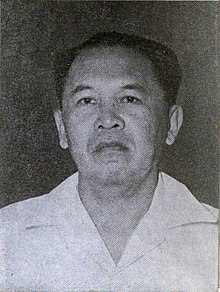Iskaq Tjokrohadisurjo | |
|---|---|
 Official portrait, 1954 | |
| Minister of Economic Affairs | |
| In office 30 July 1953 – 8 November 1954 | |
| Prime Minister | Ali Sastroamidjojo |
| Preceded by | Soemanang Soerjowinoto |
| Succeeded by | Roosseno |
| Minister of Home Affairs | |
| In office 27 April 1951 – 3 April 1952 | |
| Prime Minister | Soekiman Wirjosandjojo |
| Preceded by | Assaat Datuk Mudo |
| Succeeded by | Mohammad Roem |
| Resident of Surakarta | |
| In office July 1946 – November 1946 | |
| Preceded by | Sindoeredjo |
| Succeeded by | Sjamsuridjal |
| Personal details | |
| Born | 11 July 1896 Jombang Regency, Soerabaja Residency, Dutch East Indies |
| Died | 11 September 1984 (aged 88) Jakarta, Indonesia |
| Political party | PNI (until 1973) |
| Other political affiliations | |
| Alma mater | Leiden University (Mr.) |
| Occupation |
|
Iskaq Tjokrohadisurjo (EVO: Iskaq Tjokrohadisoerjo; 11 July 1896 – 11 September 1984) was an Indonesian politician and advocate. A member of the Indonesian National Party, he served as Minister of Economic Affairs and Minister of Home Affairs during the 1950s. Hailing from Jombang Regency and being educated in law, he received higher education at Leiden University after a five-year career in various colonial courts. Iskaq was one of the earliest native Indonesian advocates during the Dutch colonial period, founding multiple law offices across the country. He also took part in the nationalist movement, being a co-founder of the Indonesian National Party and being arrested along with its other leaders in 1929.
During the Indonesian National Revolution, Iskaq briefly served as the Resident of Banyumas and Mayor of Surakarta, before becoming Minister of Home Affairs during the Sukiman Cabinet. His policies favoring the Indonesian National Party (PNI) were controversial for other parties, and he was replaced in the succeeding Wilopo Cabinet. He returned to government office as Minister of Economic Affairs in the First Ali Sastroamidjojo Cabinet, where he became entangled in a graft scandal. He was eventually found guilty and sentenced to prison, but he received a pardon from President Sukarno. He remained active in the PNI and attempted to reunite the party during a 1965 split, until withdrawing from party politics after PNI's fusion into the Indonesian Democratic Party in the New Order period.